- Clone
- 5-25 (See other available formats)
- Regulatory Status
- RUO
- Other Names
- Polyubiquitin-C, Polyubiquitin B, RPS 27A, RPS27A, UBA 52, UBA 80, UBA52, UBA80, UBB, UBC, UBCEP 1, UBCEP 2, UBCEP1, UBCEP2, Ubiquitin, ubiquitin B
- Previously
-
Signet Catalog# 9400-02
Signet Catalog# 9400-05
Signet Catalog# 9400-10
Covance Catalog# SIG-39400
- Isotype
- Mouse IgG1, κ
- Ave. Rating
- Submit a Review
- Product Citations
- publications
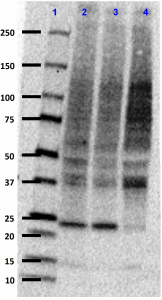
-

Western blot of anti-Ubiquitin, 64-76 (free/bound) antibody (clone 5-25). Lane 1: Molecular weight marker; Lane 2: 30 µg of human brain lysate; Lane 3: 30 µg of mouse brain lysate; Lane 4: 30 µg of rat brain lysate. The blot was incubated with a 1:2000 dilution of the primary antibody overnight at 4°C, followed by incubation with HRP labeled goat anti-mouse IgG (Cat. No. 405306). Enhanced chemiluminescence was used as the detection system. -

IHC staining of anti-Ubiquitin, 64-76 (free/bound) antibody (clone 5-25) on formalin-fixed paraffin-embedded Alzheimer's disease human brain tissue. Following antigen retrieval using Sodium Citrate H.I.E.R., the tissue was incubated with a 1:1000 dilution of the primary antibody overnight at 4°C. BioLegend´s Ultra-Streptavidin (USA) HRP kit (Multi-Species, DAB, Cat. No. 929901) was used for detection followed by hematoxylin counterstaining, according to the protocol provided. The image was captured with a 40X objective. Scale bar: 50 µm -

IHC staining of anti-Ubiquitin, 64-76 (free/bound) antibody (clone 5-25) on formalin-fixed paraffin-embedded Alzheimer's disease human brain tissue. Following antigen retrieval using Sodium Citrate H.I.E.R., the tissue was incubated with a 1:5000 dilution of the primary antibody overnight at 4°C. BioLegend´s Ultra-Streptavidin (USA) HRP kit (Multi-Species, DAB, Cat. No. 929901) was used for detection followed by hematoxylin counterstaining, according to the protocol provided. The image was captured with a 40X objective. Scale bar: 50 µm -

Western blot of anti-Ubiquitin, 64-76 (free/bound) antibody (clone 5-25). Lane 1: Molecular weight marker; Lane 2: 20 µg of Drosophila head lysate; Lane 3: 20 µg of Drosophila S2 (embryonic) cell lysate. The blot was incubated with a 1:500 dilution of the primary antibody overnight at 4°C, followed by incubation with HRP-labeled goat anti-mouse IgG (Cat. No. 436302). Enhanced chemiluminescence was used as the detection system.
| Cat # | Size | Price | Quantity Check Availability | Save | ||
|---|---|---|---|---|---|---|
| 834901 | 200 µL | 913€ | ||||
Ubiquitin is a small (8.5 kD) regulatory protein that is ubiquitously expressed in tissues of eukaryotic organisms. There are four genes in the human genome that produce ubiquitin; UBB, UBC, UBA52 and RPS27A. UBA52 and RPS27A genes code for a single copy of ubiquitin fused to the ribosomal proteins L40 and S27a, respectively. The UBB and UBC genes code for polyubiquitin precursor proteins.
Ubiquitination is a post-translational modification where a ubiquitin subunit is attached to a protein. Addition of ubiquitin can signal for degradation via the proteasome, alter cellular location, promote or prevent protein interactions, or affect activity. Ubiquitination is carried out stepwise by ubiquitin-activating enzymes (E1s), ubiquitin-conjugating enzymes (E2s), and ubiquitin ligases (E3s), respectively. The cascade results in ubiquitin bound to lysine residues on the protein or to the amino group of the protein's N-terminus.
Ubiquitinations can be either a single ubiquitin unit (monoubiquitination) or a chain of ubiquitin (polyubiquitination). Only poly-ubiquitination on defined lysines, mostly on K48 and K29, is related to degradation with the proteasome, while other polyubiquitinations (e.g. on K63, K11, K6) and monoubiquitinations may regulate processes such as endocytic trafficking, inflammation, translation and DNA repair.
A frameshift mutation in ubiquitin B can result in a truncated peptide missing the C-terminal glycine. This abnormal peptide, known as UBB+1, has been shown to accumulate selectively in Alzheimer's disease and other tauopathies.
Product Details
- Verified Reactivity
- Human, Mouse, Rat, Drosophila
- Antibody Type
- Monoclonal
- Host Species
- Mouse
- Preparation
- Ascites
- Concentration
- The concentration is not quantified as this product is sold as undiluted crude mouse ascites fluid. The concentration might vary from lot-to-lot and an estimated concentration would be 1-3 mg/ml.
- Storage & Handling
- Store at -20°C or below. Upon initial thawing, apportion into working aliquots and store at -20°C or below. Avoid repeated freeze-thaw cycles to prevent denaturing the antibody. Do not store in frost-free freezers.
- Application
-
WB - Quality tested
IHC-P - Verified - Recommended Usage
-
Each lot of this antibody is quality control tested by Western blotting. For Western blotting, the suggested use of this reagent is 1:1000 - 1:5000 in human, mouse and rat and 1:500-1:2000 in Drosophila. For immunohistochemistry on formalin-fixed paraffin-embedded tissue, a dilution range of 1:1000 - 1:5000 is suggested. It is recommended that the reagent be titrated for optimal performance for each application.
- Application Notes
-
This antibody detects ubiquitin and ubiquitinated paired helical filaments (PHF). It is specific for residues 64-76 of ubiquitin and recognizes free and bound ubiquitin, and native or detergent extracted PHF.
Reactivity to Drosophila was only verified with the purified format. - Application References
-
- Grundke-Iqbal I, et al. 1986. J Biol Chem. 261:6084-6089. (WB)
- Kudo T, et al. 1994. Brain Res. 1:1-7. (ELISA)
- Xu G, et al. 2012. PLoS One 11:e49021. (WB) PubMed
- Wang J, et al. 2003. Hum. Mol. Genet. 21:2753. (WB)
- Bazzaro M, et al. 2006. Cancer Res. 7:3754. (WB) PubMed
- Tabaton M, et al. 1991. Proc. Natl. Acad. Sci. USA 6:2098. (EM, IHC)
- Merz PA, et al. 1992. Am. J. Pathol. 2:343. (EM)
- Product Citations
-
- RRID
-
AB_2565315 (BioLegend Cat. No. 834901)
Antigen Details
- Structure
- Ubiquitin is a 76 amino acid protein with a molecular mass of 8.5 kD.
- Distribution
-
Found in almost all tissues of eukaryotic organisms.
- Function
- Regulatory protein.
- Biology Area
- Cell Biology, Neurodegeneration, Neuroscience, Neuroscience Cell Markers, Protein Trafficking and Clearance
- Molecular Family
- Autophagosome Markers, Protein Modifiers
- Gene ID
- 7316 View all products for this Gene ID
- UniProt
- View information about Ubiquitin 64-76 on UniProt.org
Related Pages & Pathways
Pages
Related FAQs
Other Formats
View All Ubiquitin, 64-76 Reagents Request Custom Conjugation| Description | Clone | Applications |
|---|---|---|
| Anti-Ubiquitin, 64-76 (free/bound) | 5-25 | WB,IHC-P |
Compare Data Across All Formats
This data display is provided for general comparisons between formats.
Your actual data may vary due to variations in samples, target cells, instruments and their settings, staining conditions, and other factors.
If you need assistance with selecting the best format contact our expert technical support team.
 Login / Register
Login / Register 









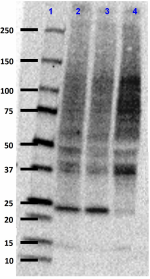
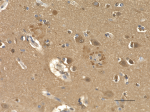
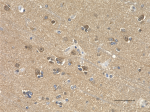
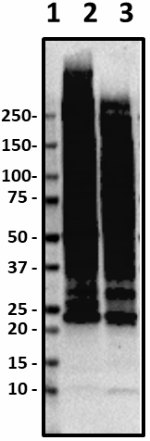



Follow Us